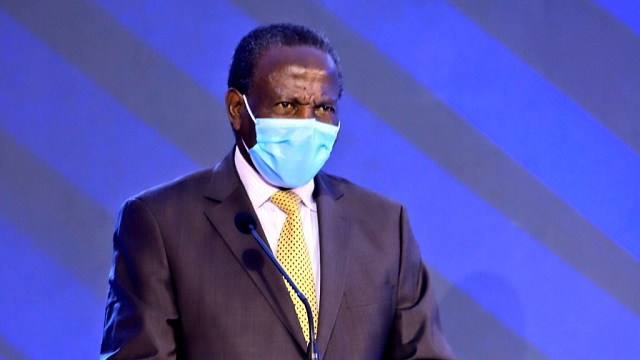
Kampala, Uganda | THE INDEPENDENT | The Minister for Finance, Planning, and Economic Development Matia Kasaija has asked governments, financial and development organizations to allocate financial resources towards climate change mitigation.
According to Kasaija, climate change is the biggest single challenge to not just the environment and human life, but the economy generally, hence the need to give it a priority when allocating financial resources.
Uganda needs up to 28.1 billion dollars to finance climate mitigation measures according to its Nationally Determined Contribution, a commitment it made in line with the 2015 Paris Agreement, for the period 2020-2030.
Kasaija says Uganda and other African countries must look for money from all over the world, warning that if countries become selfish with their resources, it will put the world at a greater risk.
He was speaking on Thursday at the East African Climate Finance Directors Regional Meeting, which was aimed at enabling the countries to share experiences on climate financing and find ways of raising sources domestically and externally.
According to Denis Mugagga, the head of the Climate Finance Unit at the Ministry of Finance, most of the cost is expected to be got from external sources, either through grants, loans, or both. He says Uganda has committed to mobilize domestic resources to cover the unconditional actions to the tune of 4.1 billion dollars (15 trillion Shillings) equivalent to 15 percent of the total.
The adaptation component of this updated NDC covers 13 sectors of agriculture, forestry, energy, health, ecosystems (wetlands, biodiversity, and mountains), water and sanitation, fisheries, transport, manufacturing, industry, mining, cities, and built environment, disaster risk reduction, tourism, and education.
It also highlights 48 priority adaptation actions and 82 indicators with targets for 2025 and 2030.
Uganda plans to implement policies and measures in the different sectors that will reduce by 24.7 percent the national greenhouse gas emissions below the current (Business as Usual) levels.
Mugagga says they are putting in place measures including developing legal instruments that will enable them to achieve these targets including resource mobilization.
Kasaija said much as poor countries have not yet contributed significantly to the current global warming levels, they have done a lot to destroy their own countries. He gave the example of the lost forest cover in Uganda from 37 percent to just over 8 percent today over the last 40 years.
He says that the money being sought should mainly target sensitization of Ugandans settling in or destroying the delicate environment like protected forests and wetlands. According to him, many people settle in these places out of ignorance hence the need to educate them but adds that the government will continue evicting them.
The campaign by the countries in the region to get finances is being facilitated by the Global Green Growth Institute (GGGI), an inter-governmental development organization headquartered in South Korea.
The organization promotes green growth, a growth paradigm that is characterized by a balance of economic growth and environmental sustainability.
The Country Representative, Dagmar Zwebe urged the governments to encourage the private sector to invest in green projects but also ensure their existing businesses install mitigation measures because the governments do not have enough money.
She explained that GGGI is not a financial organization but helps countries mobilize resources domestically and internationally, and also helps them in climate adaptation.
Giving the example of irrigation, Zwebe says while it is a way of adapting to climate change, it can make the problem worse unless proper technologies are used.
She also encourages more innovation and investment into e-mobility to reduce fossil fuels use in powering vehicles.
While she admits that there are still challenges with the electricity supply and therefore difficult to rapidly develop and maintain the electric motor industry, she says Uganda has enough resources, especially hydropower.
She says the e-mobility industry there is not something that will have an immediate impact, but that still the country is on the right path.
*****
URN
 The Independent Uganda: You get the Truth we Pay the Price
The Independent Uganda: You get the Truth we Pay the Price





